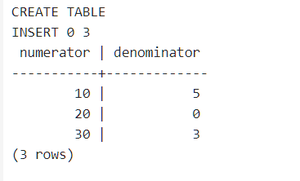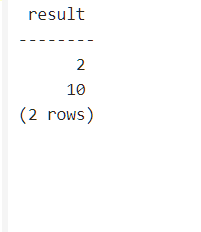Avoid Division by Zero in SQL Server
Last Updated :
19 Mar, 2024
In SQL Server, preventing division by zero errors is vital for reliable data management. Techniques like NULLIF(), CASE statements, and zero-denominator filtering ensure accurate query results and data integrity.
These methods empower database administrators to proactively address division by zero scenarios, enhancing the reliability and robustness of their SQL Server queries.
Avoid division by zero in SQL Server
Divide by zero is one of the most common problems in database queries. It can cause unexpected errors or bad results. It is essential to implement procedures and techniques in SQL Server to avoid this problem.
- Using NULLIF()
- Using CASE Statement
- Filtering Zero Denominators
Setting Up Environment
Firstly, Let’s try a common scenario where a user attempts to divide a column’s value from another column’s value. Here is a table named sample_data with the values shown below:
-- Create a table
CREATE TABLE sample_data (
numerator INT,
denominator INT
);
-- Insert some sample data with one row having denominator as zero
INSERT INTO sample_data VALUES (10, 5), (20, 0), (30, 3);
Output:

sample table
Performing Division Operation:
Query:
-- Attempting division operation
SELECT numerator / denominator AS result FROM sample_data;
Executing this query will result in a division by zero error because we’re trying to divide by zero in the second row where the denominator is zero.
Output:

Division by zero error
Solving the Division by Zero Error in SQL Server
The NULLIF() function in SQL Server returns NULL if the two specified expressions are equal, allowing us to handle division by zero effectively.
1. Using NULLIF()
This query replaces the denominator value with NULL whenever it’s zero, preventing the division by zero error.
Query:
-- Using NULLIF() to handle division by zero
SELECT numerator / NULLIF(denominator, 0) AS result FROM sample_data;
Output:

Avoid division by zero in SQL Server
Explanation: To handle division by zero, we utilize the NULLIF() function. This function replaces the second argument with NULL if the first argument is equal to it. In our case, we replace the denominator with NULL if it is zero before performing the division operation. This prevents the division by zero error.
2. Using CASE Statement
Suppose we want to calculate profit margins from sales data but need to avoid division by zero errors. We can use the following query:
Query:
-- Using CASE statement to handle division by zero
SELECT
CASE
WHEN denominator = 0 THEN 'Cannot divide by zero'
ELSE numerator / denominator
END AS result
FROM sample_data;
Output:

Avoid division by zero in SQL Server
Explanation: We employ a CASE statement to handle division by zero in another way. Here, we check if the denominator is zero. If it is, we return the string ‘Cannot divide by zero‘. Otherwise, we perform the division as usual. This approach avoids the division by zero error by providing a custom message instead.
3. Filtering Zero Denominators
Consider ranking employees based on their sales performance, where some employees may have zero transactions. We can calculate sales per transaction using:
Query:
SELECT employee_id, total_sales / NULLIF(total_transactions, 0) AS sales_per_transaction
FROM employee_sales;
Output:

Avoid division by zero in SQL Server
Explanation: In this method, we filter out rows from the “sample_data” table where the denominator is zero using a WHERE clause. By doing so, we only perform the division operation on rows where the denominator is not zero. This effectively prevents the division by zero error from occurring.
Conclusion
Handling division by zero scenarios is essential in SQL Server to maintain data integrity and query reliability. By using techniques such as the NULLIF() function, CASE statement, or filtering zero denominators, you can effectively avoid division by zero errors and ensure accurate query results. These methods provide flexibility and options for database administrators to handle division-by-zero scenarios proactively and ensure the robustness of their SQL Server queries.
Share your thoughts in the comments
Please Login to comment...